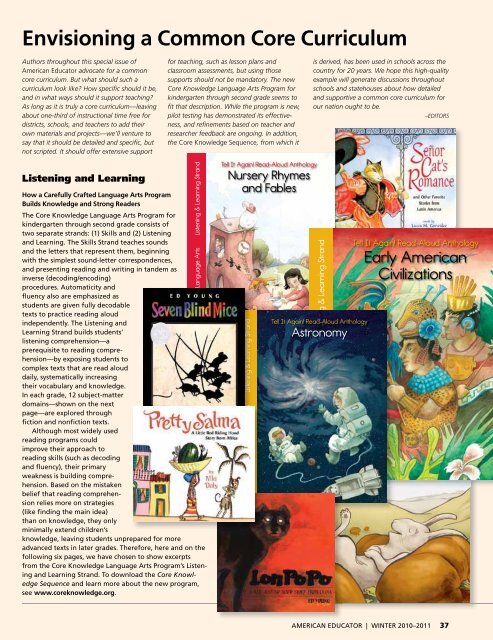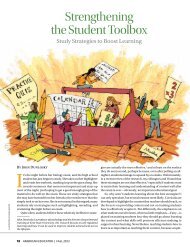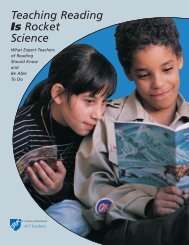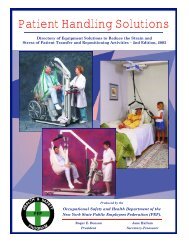American Educator, Winter 2010-11, Vol. 34, No. 4, AFT
American Educator, Winter 2010-11, Vol. 34, No. 4, AFT
American Educator, Winter 2010-11, Vol. 34, No. 4, AFT
You also want an ePaper? Increase the reach of your titles
YUMPU automatically turns print PDFs into web optimized ePapers that Google loves.
Envisioning a Common Core Curriculum<br />
Authors throughout this special issue of<br />
<strong>American</strong> <strong>Educator</strong> advocate for a common<br />
core curriculum. But what should such a<br />
curriculum look like? How specifi c should it be,<br />
and in what ways should it support teaching?<br />
As long as it is truly a core curriculum—leaving<br />
about one-third of instructional time free for<br />
districts, schools, and teachers to add their<br />
own materials and projects—we’ll venture to<br />
say that it should be detailed and specifi c, but<br />
not scripted. It should offer extensive support<br />
Listening and Learning<br />
for teaching, such as lesson plans and<br />
classroom assessments, but using those<br />
supports should not be mandatory. The new<br />
Core Knowledge Language Arts Program for<br />
kindergarten through second grade seems to<br />
fi t that description. While the program is new,<br />
pilot testing has demonstrated its effectiveness,<br />
and refi nements based on teacher and<br />
researcher feedback are ongoing. In addition,<br />
the Core Knowledge Sequence, from which it<br />
Core Knowledge Language Arts Listening & Learning Strand<br />
How a Carefully Crafted Language Arts Program<br />
Builds Knowledge and Strong Readers<br />
The Core Knowledge Language Arts Program for<br />
kindergarten through second grade consists of<br />
two separate strands: (1) Skills and (2) Listening<br />
and Learning. The Skills Strand teaches sounds<br />
and the letters that represent them, beginning<br />
with the simplest sound-letter correspondences,<br />
and presenting reading and writing in tandem as<br />
inverse (decoding/encoding)<br />
procedures. Automaticity and<br />
fl uency also are emphasized as<br />
students are given fully decodable<br />
texts to practice reading aloud<br />
independently. The Listening and<br />
Learning Strand builds students’<br />
listening comprehension—a<br />
prerequisite to reading comprehension—by<br />
exposing students to<br />
complex texts that are read aloud<br />
daily, systematically increasing<br />
their vocabulary and knowledge.<br />
In each grade, 12 subject-matter<br />
domains—shown on the next<br />
page—are explored through<br />
fi ction and nonfi ction texts.<br />
Although most widely used<br />
reading programs could<br />
improve their approach to<br />
reading skills (such as decoding<br />
and fl uency), their primary<br />
weakness is building comprehension.<br />
Based on the mistaken<br />
belief that reading comprehension<br />
relies more on strategies<br />
(like fi nding the main idea)<br />
than on knowledge, they only<br />
minimally extend children’s<br />
knowledge, leaving students unprepared for more<br />
advanced texts in later grades. Therefore, here and on the<br />
following six pages, we have chosen to show excerpts<br />
from the Core Knowledge Language Arts Program’s Listening<br />
and Learning Strand. To download the Core Knowledge<br />
Sequence and learn more about the new program,<br />
see www.coreknowledge.org.<br />
Tell It Again! Read-Aloud Anthology<br />
Nursery Rhymes<br />
and Fables<br />
Core Knowledge Language Language Language Language Arts<br />
Listening & Learning Strand<br />
is derived, has been used in schools across the<br />
country for 20 years. We hope this high-quality<br />
example will generate discussions throughout<br />
schools and statehouses about how detailed<br />
and supportive a common core curriculum for<br />
our nation ought to be.<br />
–EDITORS<br />
Core Knowledge Language Arts Listening & Learning Strand<br />
Tell It Again! Read-Aloud Anthology<br />
Astronomy<br />
Tell It Again! Read-Aloud Anthology<br />
Early <strong>American</strong><br />
Civilizations<br />
EAC_Anth_Cover.indd 1 6/2/<strong>2010</strong> 1<br />
ASTRO_Anth_Cover.indd 1 6/2/<strong>2010</strong> <strong>11</strong>:20:09 AM<br />
AMERICAN EDUCATOR | WINTER <strong>2010</strong>–20<strong>11</strong> 37





